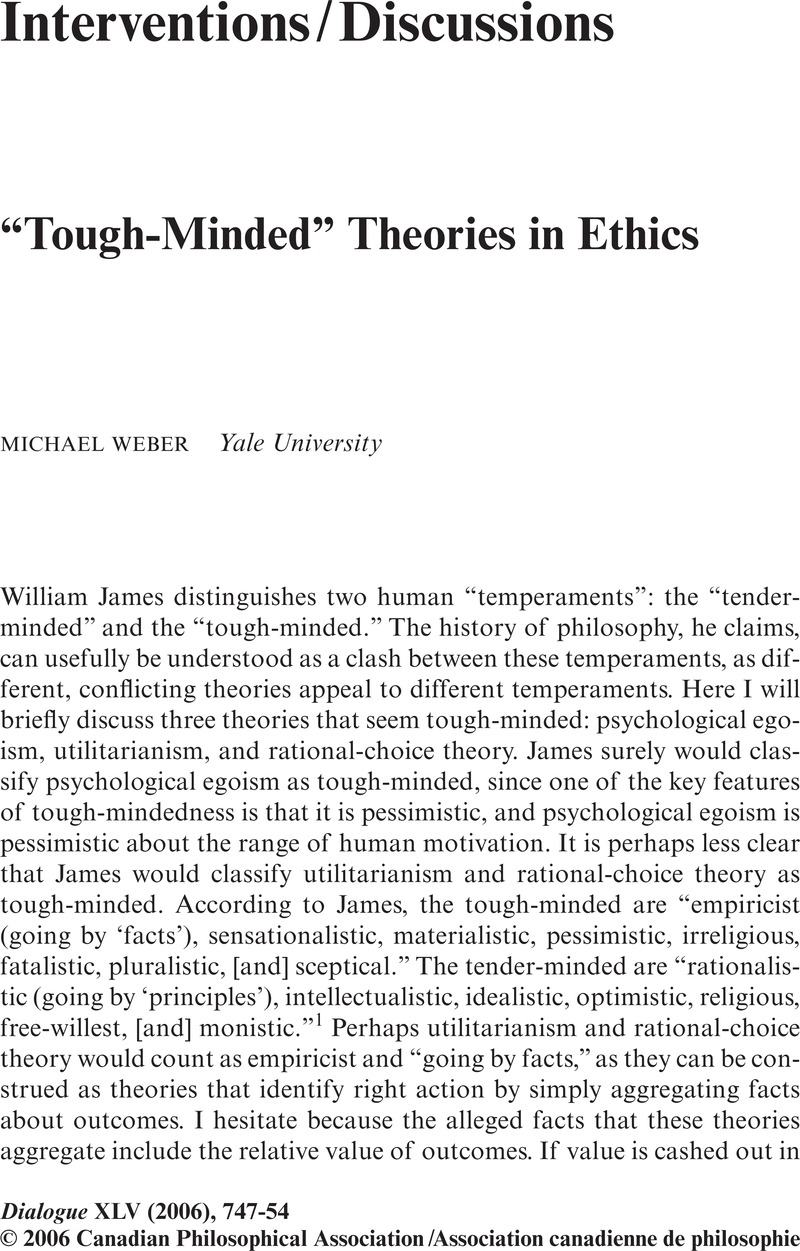Article contents
“Tough-Minded” Theories in Ethics
Published online by Cambridge University Press: 27 April 2009
Abstract

- Type
- Interventions/Discussions
- Information
- Dialogue: Canadian Philosophical Review / Revue canadienne de philosophie , Volume 45 , Issue 4 , Fall 2006 , pp. 747 - 754
- Copyright
- Copyright © Canadian Philosophical Association 2006
References
Notes
1 James, William, Pragmatism: A New Name for Some Old Ways of Thinking (New York: Longman, Green, 1907), Lecture 1.CrossRefGoogle Scholar
2 See my “The Resilience of the Allais Paradox,” Ethics, 109 (1998): 94–118.Google Scholar
3 Of course this is not the only response available to the psychological egoist, and may well not be the best. I focus on it because of how it parallels replies to objections to other tough-minded theories, all of which I think fail for the same reason.
4 Feinberg, Joel argues similarly in “Psychological Egoism,” in his edited volume Reason and Responsibility: Readings in Some Basic Problems of Philosophy, 9th ed. (Belmont, CA: Wadsworth, 1996), pp. 497–508.Google Scholar
5 There are many kinds of utilitarianism, including “average” and “rule” utilitarianism. I will not be considering such alternatives, though I think that the general run of argument that I pursue can equally be applied to these alternative forms of utilitarianism. I will also not consider non-aggregative forms of consequentialism, which may be able to avoid the pitfalls I discuss here.
6 Rawls, John, A Theory of Justice (Cambridge, MA: Harvard University Press, 1971), p. 27.Google Scholar
7 A similar argument is in Williams, Bernard, “Consequentialism and Integrity,” in Scheffler, Samuel, ed., Consequentialism and Its Critics (Oxford: Oxford University Press, 1988).Google Scholar
8 This is not to build egoism into rational-choice theory, as one may attach utility to good outcomes for others.
9 Savage, Leonard, The Foundations of Statistics, 2nd rev. ed. (New York: Wiley, 1972).Google Scholar
10 The Allais Paradox originates with Maurice Allais, in, e.g., “The Foundations of a Positive Theory of Choice Involving Risk and a Critique of the Postulates of the American School,” in Allais, M. and Hagen, O., eds., Expected Utility Hypotheses and the Allais Paradox (Dordrecht: Reidel, 1979).CrossRefGoogle Scholar
11 See, for example, Kahneman, Daniel and Tversky, Amos, “Prospect Theory: An Analysis of Decision Under Risk,” Econometica, 47 (1979): 263–91CrossRefGoogle Scholar; and MacCrimmons, Kenneth, “Descriptive and Normative Implications of the Decision-Theory Postulates,” in Borch, K. and Mossin, J., eds., Risk and Uncertainty (New York: St. Martin's Press, 1968).Google Scholar
12 This is unaffected by the declining marginal utility of money because the dollar figures in states of affairs m and n are the same for options A and B and for options C and D. The declines, then, will be identical in each case.
13 Another is disappointment, which I will not consider here.
14 John Broome is the most recent prominent advocate of this general strategy. See his Weighing Goods (Oxford: Basil Blackwell, 1991), pp. 93–100.Google Scholar
15 Indeed, a bad association with instances of good decision-making that turned out badly (cases of outcome regret) could thwart good decision-making in the future.
16 See Nozick, Robert, The Nature of Rationality (Princeton, NJ: Princeton University Press, 1993), pp. 22–23.Google Scholar
- 1
- Cited by




